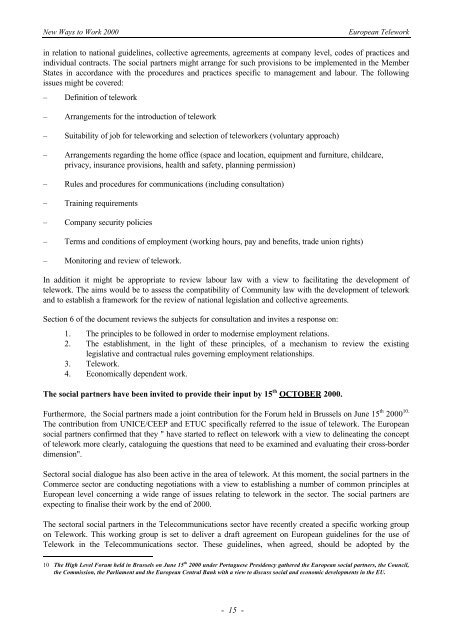eWORK 2000 - European Telework Week
eWORK 2000 - European Telework Week
eWORK 2000 - European Telework Week
- No tags were found...
You also want an ePaper? Increase the reach of your titles
YUMPU automatically turns print PDFs into web optimized ePapers that Google loves.
New Ways to Work <strong>2000</strong><strong>European</strong> <strong>Telework</strong>in relation to national guidelines, collective agreements, agreements at company level, codes of practices andindividual contracts. The social partners might arrange for such provisions to be implemented in the MemberStates in accordance with the procedures and practices specific to management and labour. The followingissues might be covered:– Definition of telework– Arrangements for the introduction of telework– Suitability of job for teleworking and selection of teleworkers (voluntary approach)– Arrangements regarding the home office (space and location, equipment and furniture, childcare,privacy, insurance provisions, health and safety, planning permission)– Rules and procedures for communications (including consultation)– Training requirements– Company security policies– Terms and conditions of employment (working hours, pay and benefits, trade union rights)– Monitoring and review of telework.In addition it might be appropriate to review labour law with a view to facilitating the development oftelework. The aims would be to assess the compatibility of Community law with the development of teleworkand to establish a framework for the review of national legislation and collective agreements.Section 6 of the document reviews the subjects for consultation and invites a response on:1. The principles to be followed in order to modernise employment relations.2. The establishment, in the light of these principles, of a mechanism to review the existinglegislative and contractual rules governing employment relationships.3. <strong>Telework</strong>.4. Economically dependent work.The social partners have been invited to provide their input by 15 th OCTOBER <strong>2000</strong>.Furthermore, the Social partners made a joint contribution for the Forum held in Brussels on June 15 th <strong>2000</strong> 10.The contribution from UNICE/CEEP and ETUC specifically referred to the issue of telework. The <strong>European</strong>social partners confirmed that they " have started to reflect on telework with a view to delineating the conceptof telework more clearly, cataloguing the questions that need to be examined and evaluating their cross-borderdimension".Sectoral social dialogue has also been active in the area of telework. At this moment, the social partners in theCommerce sector are conducting negotiations with a view to establishing a number of common principles at<strong>European</strong> level concerning a wide range of issues relating to telework in the sector. The social partners areexpecting to finalise their work by the end of <strong>2000</strong>.The sectoral social partners in the Telecommunications sector have recently created a specific working groupon <strong>Telework</strong>. This working group is set to deliver a draft agreement on <strong>European</strong> guidelines for the use of<strong>Telework</strong> in the Telecommunications sector. These guidelines, when agreed, should be adopted by the10 The High Level Forum held in Brussels on June 15 th <strong>2000</strong> under Portuguese Presidency gathered the <strong>European</strong> social partners, the Council,the Commission, the Parliament and the <strong>European</strong> Central Bank with a view to discuss social and economic developments in the EU.- 15 -








